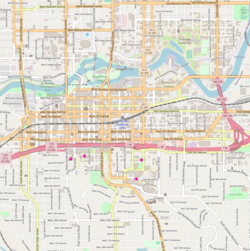History
Founded after the Great Spokane Fire of 1889, the North Side Baptist Church grew rapidly during Spokane's boom period. It initially met in the Spokane County Courthouse. [2] By 1903, the church had hundreds of members, had established several missions, and had commissioned J. K. Dow to design a large church in what is today West Central. The church's National Register listing described it as "one of the most substantial structures on the growing north side, and one of the finest churches in the city. Today, it retains excellent integrity, and is distinguished by its arched openings, buttresses, battlemented parapets, stained glass, and dramatic interior auditorium." [3]
Christ the Redeemer Church began in 1993 when a group of families at the Cathedral of St. John the Evangelist adopted an evangelical theological outlook. [4] After their request to plant a new Episcopal mission church was rejected by the bishop of Spokane, the group of 17 adults and 20 children began meeting in private homes. [5] The church incorporated in 1994 under the name Christ the Redeemer. [4] One of the founders read about Michael Youssef, who had a few years prior left the Episcopal Diocese of Atlanta and planted Church of the Apostles as an independent congregation. Youssef recommended that Christ the Redeemer contact Moore Theological College. In 1994, Sydney Archbishop Donald Robinson visited Spokane to teach, preach, and celebrate communion for Christ the Redeemer. [5] Robinson later sent Peter Hayward—a future Bishop of Wollongong in the Diocese of Sydney—to serve as pastor of Christ the Redeemer. Hayward and both of his successors as pastor of Christ the Redeemer are Moore Theological College graduates. [5]
In the late 1990s, Christ the Redeemer moved away from historic Anglican practices like having a vestry, the importance of bishops, infant baptism, and the theology of Holy Communion toward its present independent reformed, evangelical stance. [4] In the early 2000s, Christ the Redeemer began renting space from Grace Baptist. After Grace Baptist's pastor retired, the churches began worshiping together for an interim period, after which the congregations merged and Christ the Redeemer became the owner of the historic Grace Baptist building. [4]
This page is based on this
Wikipedia article Text is available under the
CC BY-SA 4.0 license; additional terms may apply.
Images, videos and audio are available under their respective licenses.

